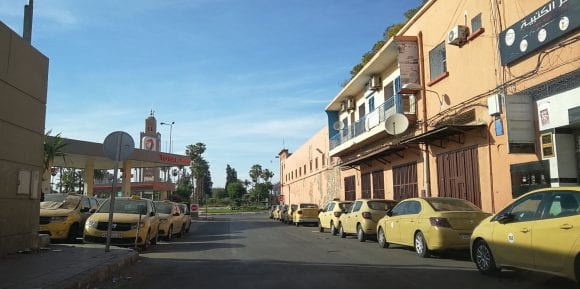IMAGE OF THE WEEK

Bronwen Powell in Morocco shares this photo she recently took (from the car) on her way home from the supermarket. “There are rows and rows of taxis parked along the streets beside the bus station near the famous Koutoubia mosque in central Marrakech. This time of year is normally the peak tourist season and it is often very difficult to flag a taxi,” she said.
GOOD NEWS
Jianfan Yang received a box of 450 N95 masks from his relatives and was able to donate the masks to Mt. Nittany Medical Center.
Marie Louise Ryan received the Graduate Student International Research Award.
A class project in GEOG 586 in the online MGIS program has been accepted for publication in PlosOne. Blanford, J.I., T. Belcher, T. Black, E. Derner, J. Dunham, E. Galvan Campanero, M. Gority, R. Jones, B. Kaley, J. Kuli, R. Ligon, E. Mandal, T. Quink, J. Shinsky, M. Sodek, N. Teigland, and S. Turne collaborated on, “Pedal Power: Explorers and commuters of New York Citi Bikesharing scheme.”
Hannah Schreck was named a spring 2020 EMSAGE Laureate.
Working Remotely with Geospatial Data and Mapping Projects online session will introduce graduate students to geospatial data from U.S. and international sources, along with information on geospatial software access at Penn State including ArcGIS Online, ArcGIS ArcMap, and ArcGIS Pro. 3 p.m. on Friday, May 15, 2020.
Esri Offers Students Free Access to Software through August 31.
NEWS
USGIF Announces K. Stuart Shea Endowed Scholarship Recipient
The United States Geospatial Intelligence Foundation (USGIF) recognized Wendy L. Zeller Zigaitis, a Pennsylvania State University (PSU) Ph.D. student, as the 2020 recipient of the Foundation’s K. Stuart Shea Endowed Scholarship.
RECENTLY PUBLISHED
Virtual reality for student learning: Understanding individual differences
Li, P., Legault, J., Klippel, A., & Zhao, J.
Human Behaviour and Brain
https://doi.org/10.37716/HBAB.2020010105
Virtual reality (VR) is emerging as a rapidly developing technology that holds significant promises to impact student learning. In this review, we focus on the features of this technology regarding levels of immersion and interaction and individual differences in cognitive characteristics of VR learners. We attempt to parse the specific technological features that enable effective learning and examine how students mentally process these features. While VR helps to create situated learning conditions, its theoretical significance lies in its ability to provide perception-action enabled experiences to the learner, and it is these experiences that lead to positive behavioural and brain outcomes compared to traditional methods of learning. Our discussion highlights the understanding of VR learning with respect to individual differences, especially in spatial abilities of the learner, and how variability in spatial abilities might impact both spatial learning and language learning.
